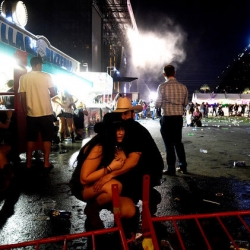
MGM Resorts sued 1,977 shooting survivors and family members of the deceased in order to preempt Mandalay Bay liability lawsuits.
MGM Resorts International is being criticized for its handling of a lawsuit against hundreds of survivors of the 2017 Las Vegas mass shooting. MGM Resorts, which owns the casino-hotel from which the shooter fired on a crowd, offered to donate process server fees to charities if survivors would waive their right to sue the company.
In July, MGM Resorts filed a preemptive lawsuit against nearly 2,000 people who were impacted by shooting at the Route 91 Harvest Festival on the night of October 1, 2017. As 22,000 concert goers watched country music performer Jason Aldean give his concert at Las Vegas Village between 10:05 and 10:15 p.m. that night, Stephen Paddock shot into the crowd from his 32nd story suite at the Mandalay Bay.
The lawsuit targets those injured in the mass shooting, as well as family members of the deceased. MGM Resorts filed the lawsuit to have a federal judge declare the company has no liability to survivors or families of slain victims.
9/11 Federal Law Cited in Lawsuit
Under a novel interpretation of a federal law signed in the wake of the September 11 attacks, MGM Resorts argues it is no liable for what happened outside Mandalay Bay on October 1. The company’s lawyers are citing a federal law enacted after the 9/11 terrorist attracks which limited liability of companies or groups which used security services approved by the U.S. Department of Homeland Security.
In the company’s federal court filing, its lawyers argue that MGM Resorts International is free of liability because the security vendor for Las Vegas Village, the venue of the concert involved, was federally certified at the time of the mass shooting.
Oct. 1 2017 Mandalay Bay Shooting
When he shot into the crowd that night, Stephen Paddock killed 58 concert goers and caused injuries to 800 others. Some of those injured were hit by rounds from Paddock’s AR-15 rifle, while others were hit by shrapnel or injured in the panic trying to get to safety.
In the wake of the shooting, Mandalay Bay management was criticized, because it allowed Stephen Paddock to isolate himself in his hotel room for 4 to 5 days without any kind of security check. Paddock also got Mandalay Bay concierge to help him carry dozens of weapons into his hotel room, one-by-one over a several day period. To preempt the chance victims of the shooting might sue MGM Resorts, the Las Vegas Strip casino company sued those harmed in the shooting.
MGM Sued 1977 Survivors and Family Members
It faces a standard 90-day deadline to inform the 1,977 people they are being sued. As it does so, MGM Resorts has sent letters to the defendants that the company would waive the $250 fee paid to process servers if the defendants waive their right to sue. Instead, MGM Resorts would make a $500 charitable donation to “for each person who waives being served or authorizes an attorney to accept service on their behalf”.
MGM Resorts’ attorneys wrote a letter to those sued which stated, “The money spent on personal service of process — up to $250 per person — could be better directed to do some affirmative good.”
Robert Eglet Calls Letters “Nonsense”
Along with the decision to sue the victims in the first place, the letter has come under criticism for being crass and insensitive. Attorney Robert Eglet, who represents a majority of the victims, called the letter “nonsense” and said the casino company is simply trying to save money on the notification process.
Eglet told the Associated Press, “It will cost MGM significantly more than $250 to serve them. This is just more outrageous conduct by them.”
Mr. Eglet said that most of the firms representing the survivors have not been authorized to accept the deal. If they refuse, then MGM Resorts would be required to find and serve 1,977 people with notification they are being sued. Then the defendants would be required to respond to the lawsuit within a 21-day period.
MGM’s Side of the Story
MGM Resorts contends that its lawsuits, which do not demand money from the defendants, are designed to avoid years of costly litigation. Debra Deshong, a spokeswoman for MGM Resorts, said of the company’s process servers, “We will personally serve the complaints courteously and respectfully.”
Given the fact MGM Resorts is suing to avoid years of lawsuits, the company feels justified in trying to settle the issue at an early date without years of litigation. A publicly-traded casino company which is in the tourism and leisure business has to consider public relations in everything it does, so the deal offered by its lawyers opens the company to criticism. Since the letter was sent to nearly 2000 people, it was certain to become public.
The current case likely is a situation where the legal department and PR department at MGM Resorts are at odds. Given the fact Robert Eglet and other survivors’ law firms are instructing their clients not to accept the deal, the $500 charitable donation letter appears to have backfired. MGM Resorts generally handles its public relations in better order than this instance, though the Mandalay Bay shooting presents anyone involved with a no-win situation.
